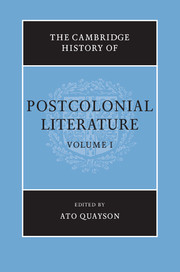Book contents
- Frontmatter
- 1 Introduction: postcolonial literature in a changing historical frame
- 2 Postcolonial fictions of slavery
- 3 Postcolonialism and travel writing
- 4 Missionary writing and postcolonialism
- 5 Postcolonial auto/biography
- 6 Orality and the genres of African postcolonial writing
- 7 Canadian literatures and the postcolonial
- 8 Postcolonialism and Caribbean literature
- 9 Postcolonialism and Arab literature
- 10 Postcolonialism and postcolonial writing in Latin America
- 11 Postcolonial writing in South Africa
- 12 Postcolonial literature in Southeast Asia
- 13 Postcolonial South Asian poetry
- 14 Postcolonial writing in India
- 15 Postcolonial writing in Australia and New Zealand
- 16 Indigenous writing in Canada, Australia and New Zealand
- 17 Postcolonial writing in Ireland
- 18 Postcolonial writing in Britain
- 19 Postcolonial writing in France
- 20 Postcolonial writing in Germany
- References
17 - Postcolonial writing in Ireland
Published online by Cambridge University Press: 28 January 2012
- Frontmatter
- 1 Introduction: postcolonial literature in a changing historical frame
- 2 Postcolonial fictions of slavery
- 3 Postcolonialism and travel writing
- 4 Missionary writing and postcolonialism
- 5 Postcolonial auto/biography
- 6 Orality and the genres of African postcolonial writing
- 7 Canadian literatures and the postcolonial
- 8 Postcolonialism and Caribbean literature
- 9 Postcolonialism and Arab literature
- 10 Postcolonialism and postcolonial writing in Latin America
- 11 Postcolonial writing in South Africa
- 12 Postcolonial literature in Southeast Asia
- 13 Postcolonial South Asian poetry
- 14 Postcolonial writing in India
- 15 Postcolonial writing in Australia and New Zealand
- 16 Indigenous writing in Canada, Australia and New Zealand
- 17 Postcolonial writing in Ireland
- 18 Postcolonial writing in Britain
- 19 Postcolonial writing in France
- 20 Postcolonial writing in Germany
- References
Summary
Was Ireland a colony? If by colonization we mean the conquest of one society by another more powerful society on its way to acquiring a vast empire, the settlement of the conquered territory by way of population transfers from the conquering one, the systematic denigration of the culture of the earlier inhabitants, the dismantling of their social institutions and the imposition of new institutions designed to consolidate the recently arrived settler community’s power over the ‘natives’ while keeping that settler community in its turn dependent on the ‘motherland’, then Ireland may be considered one of the earliest and most thoroughly colonized regions of the British Empire. The initial process of colonization began under the Tudors in the 1550s with the plantation of the Irish midlands, continued with Munster plantation in the 1580s, was extended to the north with the Ulster plantation in the 1590s and early 1600s, and was completed by the Cromwellian conquest and land confiscations in the 1640s. In this process, the Gaelic clan system and the Hiberno-Norman (or Old English) dynasties were almost entirely shattered and the spiritual and cultural institutions of the old Irish order – namely, the Catholic abbeys and monasteries and the secular Gaelic Bardic septs – were also dismantled and replaced by the English-language and Protestant culture of the new elites. The earlier economic system based on pastoral herding was also eliminated as Ireland was integrated into the mercantile capitalist order that the European empires were already expanding into a world system stretching across the Americas and Asia.
- Type
- Chapter
- Information
- The Cambridge History of Postcolonial Literature , pp. 539 - 570Publisher: Cambridge University PressPrint publication year: 2012
References
- 1
- Cited by



